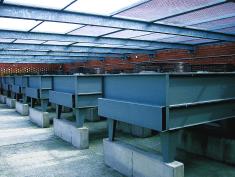The benefits of inverter control in air-cooled condensers

Inverter control of fans in the air-cooled condensers of air-conditioning and process-cooling systems brings a host of operations, maintenance and energy-efficiency benefits.
Gareth Holden highlights the many benefits of variable-speed drives for air-cooled condensers – including complying with a noise-abatement order.Installing variable-speed drives (VSDS) to control pumps and fans will in many commercial and industrial applications deliver significant energy reductions. The primary reason is because there is a cube relationship between power and speed.
Energy savings It is well documented that for a number of examples, such as the control of condenser fans in air-conditioning and refrigeration systems, even greater energy savings can be achieved. The cause is no secret, but deserves greater recognition. Quite simply, it is based on the effect that installing a single inverter can have on reducing condensing temperature. These fans are used to control the discharge pressure from the compressor. In an air-cooled system, this will normally consist of a multi-fan condenser with the fans sequenced individually from a step control to maintain the required pressure. This type of control is called ‘saw tooth control’, as it results in the pressure fluctuating between, say, 16 to 18 bar for example, with an average of 17 bar. When a single inverter is applied to control all of the fans in parallel, we can maintain a set pressure of 16 bar by modulating all the fans together. The compressor will now operate at a condensing temperature 6 K lower than that achieved with the step control. You should consider the following rule of thumb: for every 1 K that condensing temperature is reduced, refrigeration efficiency is increased by 2%, and the absorbed power of the compressor is 10 to 15 times that of the condenser fans. It is worth committing this information to memory when you consider the scale of savings that can be made in this way.
More good news There is even more good news though. Often the fans are rated to operate up to 60 Hz, which, with an appropriately sized inverter, increases fan speed by 20 %. Depending on design, this can reduce discharge pressure by a further 0.5 to 0.75 bar. This also ensures good heat rejection at high ambient temperatures, where some systems will trip due to high discharge pressure — exactly when you need efficient cooling. Now we come to the all-important maintenance dividend. On many condensers that have been operating for some time, the motors fitted to the first fans in sequence need constant attention due to the mechanical shock caused by constant cycling to maintain the correct pressure. The bearings on the last fans in sequence are often seized, often because they have been idle during the winter. In our experience, it is only on the first ‘hot’ day of spring or summer, when the system trips on high pressure, that this defect is noticed. The application of inverter control means that all fans are kept rotating and do not need to cycle to maintain conditions. We encountered these problems when we were surveying process chillers at a large telecomms satellite station. The solution was very well received. Often, a visual inspection will show the first section of the condenser is blocked, as a result of the lead fans pulling air through this section at high velocity. The use of an inverter means that low-velocity air passes through the entire condenser face, resulting in less debris blocking the heat exchanger.
Noise In some instances, the noise generated by condensers can prove the bugbear. In a recent case, a food processing company in a rural idyll had, understandably, been receiving complaints from a local homeowner, who claimed that their sleep was being constantly disturbed by the change in pitch due to fan cycling. The local authority, under noise abatement rules, insisted that the company take immediate action to overcome the problem. This even came with a recommendation that the condensers be located in a baffled compound to reduce noise. What was not stated in the document was that this measure would also reduce airflow and increase energy consumption. The application of an inverter control solved the problem at a stroke and saved the company tens of thousands of pounds needed to build an acoustic enclosure. Above all, it was also an environmentally sound solution.
Gareth Holden is sales and commercial director with Excalibur LPA Ltd, Pelican House, 83 New Street, Andover, Hants SP10 1D
info@excaliburlpa.co.uk
Related links:


